QuestionI've had my Gecko for about 10 months now and it has been normally healthy until this week. I recently relocated to NYC and since I moved into my apartment it won't eat crickets or mealworms. I'm getting really concerned because I don't know whats wrong or how to help! Any insight would help.
Thanks!
AnswerHi Rachel,
I know how you feel!!! I hate when any of my critters go off of food.From reading your question, I gather its only been a few days of not eating..which, right now, isn't a problem unless you notice other problems such as lethargic or vomiting, etc.
Double check all your temperatures, hid spots, etc and make sure its not a problem related to this that is causing the not wanting to eat...
Many times, with geckos,(I'm assuming a leopard gecko, if I am wrong, let me know) when something changes in their life, they stress out. One of the things that stress causes is not eating. With the move, here are a few things that could have caused stress. different surroundings, different noises, different temperatures, etc..I'm going to ask you a few questions, which, you don't need to reply to me with your answers, but may help you in deciding how/what to do.
In the move, did you rearrange the tank at all?
have you double checked your temperatures to be sure they are still where they need to be? (I've included a care sheet)
Are you in a noisier part of the city where he can hear more noise?
Is his tank now in an area that he gets a view of more/less/different things?
Is his tank now in an area where he gets more/less light?
Now, on to other things!!!
Its not uncommon for a leo to go through some periods of time of not eating when the temperatures change and also seasonal changes.
When a leo has a good storage of fat(their tails are where they store their fat) a week or two w/o eating is not a problem for them. All reptiles have parasites..they actually need to have a very low level of them for there health(gross, huh?) With stress, the parasite load may become heavier than it should be, which can cause the lack of eating.
It might be a good idea to have a fecal check done to rule out this problem...
I would try a few simple little things with your leo...
Many will eat some baby good meats(chicken) or baby food fruits.... try touching the end of his mouth with either of these foods(dip your finger in the food)...his normal reaction will be to lick at it.. he may like it..and continue to lick at the food.. Also...try a wax worm or two...(no more than that because in the reptile world, wax worms are candy!! They can become very spoiled on them, not wanting to eat their other correct insects. If he eats the wax worms, chances are, he is just a little stressed with the move and doesn't want his normal foods and will again start eating on his own. To entice him, if he did like the wax worm, allow a few to crawl in the dish with the other insects you feed, then remove the wax worms(the scent of the wax worm will have rubbed off a bit on the other insects.To keep crickets in the dish, breaking the crickets hind legs where they bend ...gross, I know....but..it works and sometimes we gotta do what we gotta do for our pets!!
A few more thoughts... if you are using sand, is it possible that he has eaten some of the sand? This can and does cause a blockage in their intestines. If this is a possibility, a vet is needed to x ray , diagnose and treat.
Please do give me an update about how your gecko is doing and if you have any more questions, be sure to ask!!!!
BASIC CARE FOR A LEOPARD GECKO
Leopards are pretty easy to care for but they do need
special care. Here are some of the basic needs of your
gecko.
HOUSING: The need to have at least a 20 gallon long tank for
one Leo. This needs to have a secure fitting screen top...they can be quite the escape artists!!! They need to have a humid hide box.You can make
this with something as simple as a small plastic dish with a
hole cut in one side and a small mesh bag filled with some
Sphagnum moss, coconut bark or Peat moss that you mist.
I made mine out of the small plastic folgers coffee containers...I cut an opening in the lid..and put the moss in..they LOVE it. I use the terrarium moss in mine.
I use that on the warm side of the tank. Be sure to provide a cool hidebox on the other end. I use the critter caves which you can purchase. NOT the ones that have heat in them!!!!
Provide secure climbing areas for your gecko. Fake plants, rocks and branches are all fine to use.
SUBSTRATE:(that's the stuff on the floor of your tank) News
paper, lizard carpet or paper towels work great and are easy
to clean and are much safer than any loose substrate.
TEMPERATURES: They need a warm area of 88-90 degrees and a
cooler area in the upper 70s, low 80s. At night their
temperature can drop to the low to mid 70's.
Never use a hot rock for a leopard gecko...or any reptile.
They can severely burn any reptile. You can use a heating
pad under the tank, or you can use a regular household
lightbulb in a dome fixture with a ceramic socket in it to
keep the warm area at the 88-90 degree area.At night, no white light. If room temperatures stay above 70 degrees, no extra night heat is needed.
You can use the special nighttime lights that are designed for reptiles. I like using a ceramic heat emitter on a thermostat for nighttime heat.
DO NOT use black lights or party lights as they can cause eye damage!!!!
The wattage you use will vary based on room temperature and size of tank.
LIGHTING: Leopard geckos do not need UVB lighting but it does not hurt them to give them uvb. They should have some type of light during the day, be it a uvb tube, regular florescent light, reptile day light or regular household lightbulb. NO white lights at night!!!
FEEDING: Geckos should not be fed crickets or other insects that are bigger than the space between their eyes. Crickets and other food items such as silk worms, super, and an occasional treat of a wax worm, need to be dusted with a calcium supplement two times a week and also they should have a small dish of calcium in their tank. I use the lid of a milk jug for the little dish of calcium in their tank. For dusting the insects, Use a calcium with no added phosphorus.
Insects must be gut loaded(fed) for at least 48 hours prior to feeding your gecko. Remove any uneaten crix or superworms after 15-20 minutes..... Place a piece of cut potato in the tank so that if you have missed any uneaten insects, they will eat the potato instead of nibbling on your gecko!!!
You have to be sure to feed your crickets the right foods
before feeding them to your gecko. If your crickets/insects are not healthy and well fed, your gecko will not get the nutrition
he needs. You can gut load your crickets greens, veggies, cereals or specially designed commercial foods for crickets or the insects you are feeding.
Be sure to have a small dish of clean water for your gecko
at all times!!
You can offer them some baby food or fruits on occasion ...
Mine will even eat a small piece of watermelon now and then.
WATER: always provide a dish of drinking water. If you choose to mist your gecko to drink, its best to not get the tank too wet as that they do not do well with higher humidity. Sometimes its better to take your leo out of their tank to mist them to get them to drink!!!
HANDLING: Some geckos enjoy being held...others prefer not to be handled at all. Be sure to be very gentle when holding your leo and NEVER grab them by the tail! Their tails are extremely fragile and will break.
I do suggest finding a vet that can treat reptiles BEFORE you actually need one!!! To find a vet that is able to care for reptiles:
http://www.anapsid.org/vets
For more information on leopard geckos:
http://www.thegeckospot.com/leocareindex2.html
http://www.drgecko.com
If you have anymore questions or don't understand something, please be sure to ask.
Diane

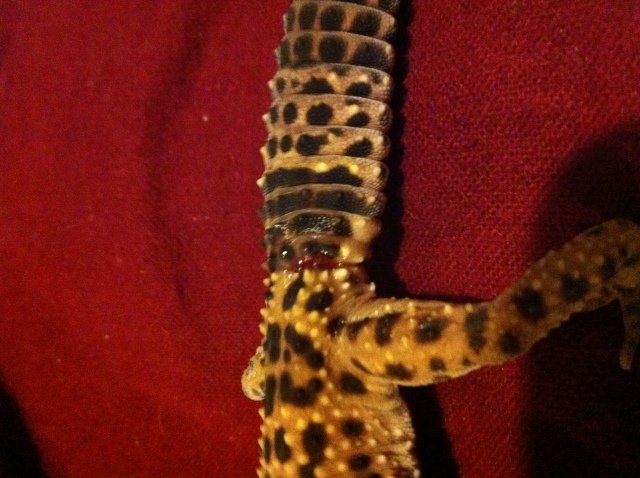 Leos tail
QuestionQUESTION: I have a leopard gecko who is about s
Leos tail
QuestionQUESTION: I have a leopard gecko who is about s
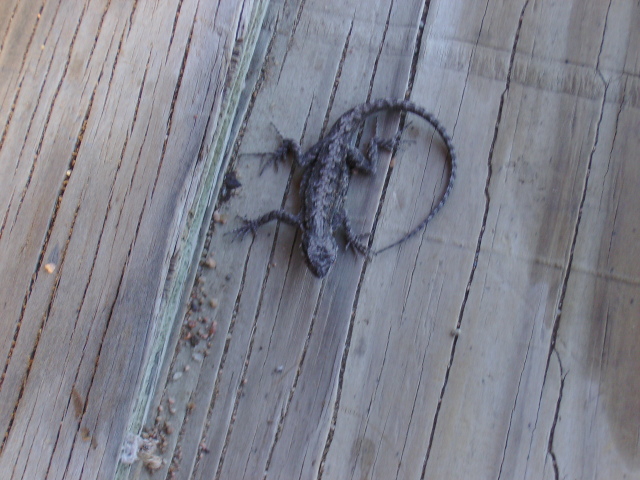 ID central Texas lizard?
QuestionQUESTION: I have a strangely acting and type of
ID central Texas lizard?
QuestionQUESTION: I have a strangely acting and type of
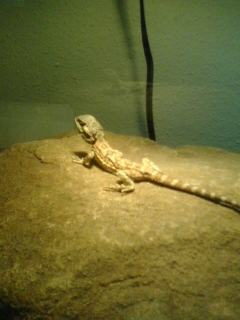 My baby bearded dragon wont eat...
QuestionSandfire
QUESTION: Hi there,
I just got
My baby bearded dragon wont eat...
QuestionSandfire
QUESTION: Hi there,
I just got
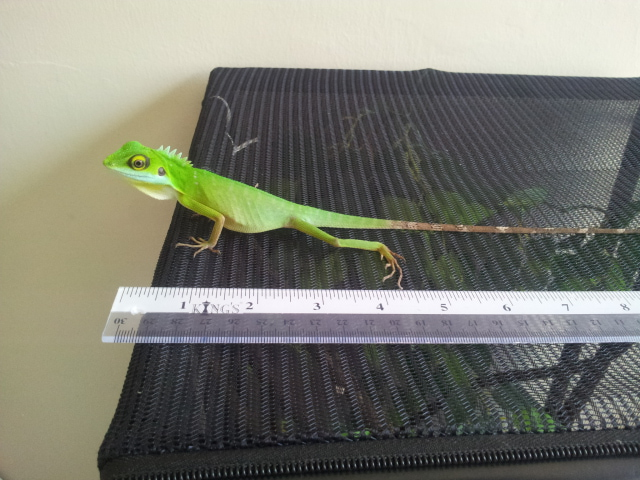 Lizard not eating :(
QuestionCrested Lizard
QUESTION: Hi,
First off,
Lizard not eating :(
QuestionCrested Lizard
QUESTION: Hi,
First off,
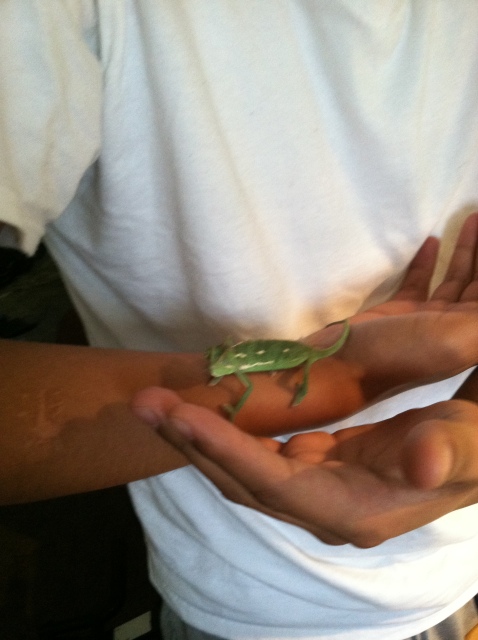 veiled cahmeleon
Question
veiled chameleon
I am very grateful for
veiled cahmeleon
Question
veiled chameleon
I am very grateful for